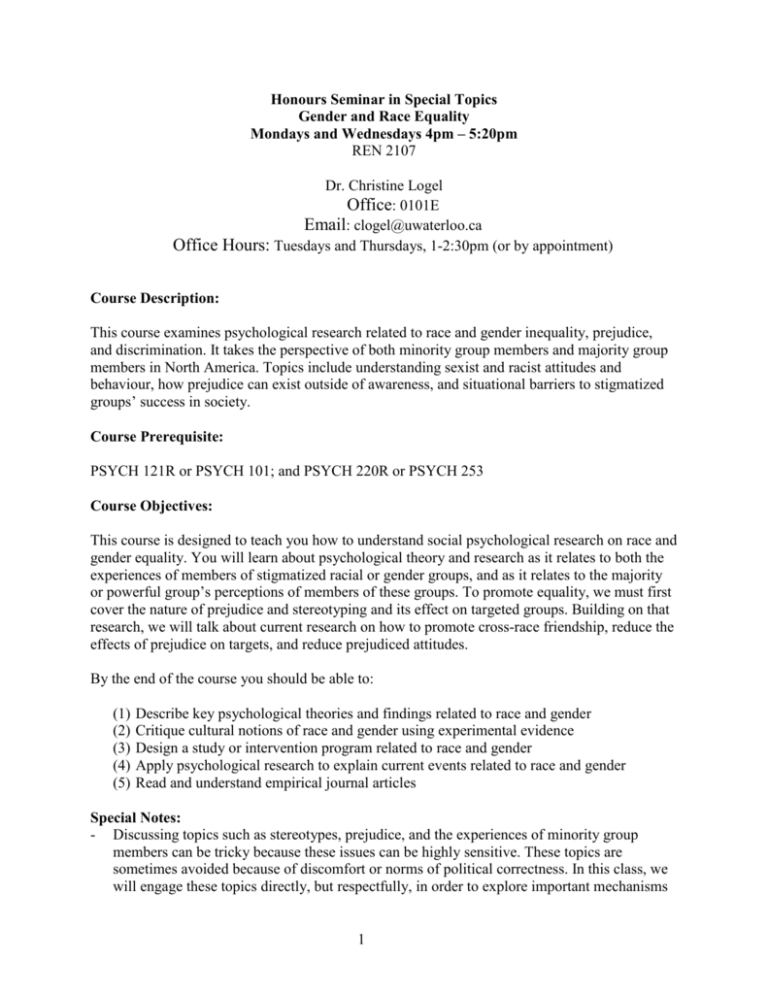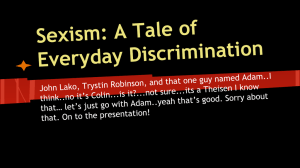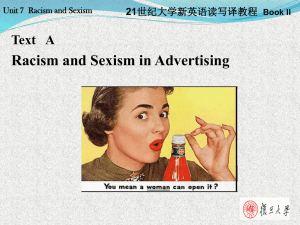Course Objectives - University of Waterloo
advertisement

Honours Seminar in Special Topics Gender and Race Equality Mondays and Wednesdays 4pm – 5:20pm REN 2107 Dr. Christine Logel Office: 0101E Email: clogel@uwaterloo.ca Office Hours: Tuesdays and Thursdays, 1-2:30pm (or by appointment) Course Description: This course examines psychological research related to race and gender inequality, prejudice, and discrimination. It takes the perspective of both minority group members and majority group members in North America. Topics include understanding sexist and racist attitudes and behaviour, how prejudice can exist outside of awareness, and situational barriers to stigmatized groups’ success in society. Course Prerequisite: PSYCH 121R or PSYCH 101; and PSYCH 220R or PSYCH 253 Course Objectives: This course is designed to teach you how to understand social psychological research on race and gender equality. You will learn about psychological theory and research as it relates to both the experiences of members of stigmatized racial or gender groups, and as it relates to the majority or powerful group’s perceptions of members of these groups. To promote equality, we must first cover the nature of prejudice and stereotyping and its effect on targeted groups. Building on that research, we will talk about current research on how to promote cross-race friendship, reduce the effects of prejudice on targets, and reduce prejudiced attitudes. By the end of the course you should be able to: (1) (2) (3) (4) (5) Describe key psychological theories and findings related to race and gender Critique cultural notions of race and gender using experimental evidence Design a study or intervention program related to race and gender Apply psychological research to explain current events related to race and gender Read and understand empirical journal articles Special Notes: - Discussing topics such as stereotypes, prejudice, and the experiences of minority group members can be tricky because these issues can be highly sensitive. These topics are sometimes avoided because of discomfort or norms of political correctness. In this class, we will engage these topics directly, but respectfully, in order to explore important mechanisms 1 and theory that underlie stereotyping, prejudice, and minority experience. Each class period will allow time for discussion, and students are encouraged to raise any concerns with the instructor either in class or privately during office hours. - Although Canadian content is used where possible, much of the material for this course is based on American findings, because some research has only been conducted in the US and not in Canada. We will discuss the implications of the lack of Canadian research and consider what sort of research would be necessary to establish the generalizability of the US findings. - Although the course aims to discuss issues related to a wide range of ethnicities, much of the existing research focuses on issues related to people who are White and Black, followed distantly by research related to people of East Asian descent, Hispanic descent, and Aboriginal Canadians or American Indians. There is little research involving other ethnicities. The course will attempt to bridge some of this gap through discussion, and students are encouraged to think beyond existing research for their assignments. Grade Evaluation: ITEM Test Attendance at, and participation in, class and class discussions Role Model Presentation Paper Thought question and participation in thought question discussion Individual presentations in class. Attendance at, and participation in, others’ presentations WEIGHTING 30% 5% DATE March 5 Jan 9 to March 7 5% 25% 5% Jan 9 to March 7 April 2 Feb 29 and March 7 25% March 12 to April 2 5% March 12 to April 2 Format of Tests: The test includes essay and short written answer items from the lecture, and will require a thorough understanding of the assigned readings. Students are responsible for all material covered in the course. Role Model Presentations: Role models are well-known to help create equality by providing counterexamples to members of the majority group and giving confidence to members of the minority group. Each class, one or two students will very briefly describe a gender or racial role model. Very little research is needed – Wikipedia is fine. Just show a picture and tell the class what this person did and how he/she can be a role model to others to promote equality. 2 Paper: Papers should be no more than 2000 words. A marking scheme will be available on UW-ACE. More information will be provided in class. It is strongly recommended that you show Dr. Logel an outline of your paper and get her feedback. If you hand in your assignment early, Dr. Logel will give you feedback and an interim mark. You may choose to keep that mark, or incorporate her feedback and attempt to increase your mark. You may do this as many times as you want until you are satisfied with your mark, provided that you submit a final version by the deadline on the syllabus, and that you allow at least one week for Dr. Logel to return it with her comments. E.g., If you submit your paper two weeks before the deadline, Dr. Logel will return it with comments within one week, and you will have one week to make changes and resubmit by the deadline. No changes will be accepted after the deadline on the syllabus. For the assignment, you may choose from one of these options. If you have an idea for a different format, that may be acceptable as well, provide you talk to Dr. Logel and get her approval first. Option #1. You are a graduate student in a PhD program of your choice. Write a short grant proposal that, if awarded, could fund your research. First describe two studies that were covered in the lecture or readings, and then describe a follow-up study that you would run. Include a description of what participants in your study would experience, and what you would learn about gender or race from that study. Option #2. You are a social worker hired to design a program to teach high school students about sexism and racism, OR to reduce their sexism or racism, OR to inoculate minority students against the negative consequences of sexism or racism. Write an outline for the program, describe two studies from the lecture or readings that will either inform how you design the program, or will be presented to the high school students. Discuss at least one existing program and why yours is better in some way. Include at least three elements in your program (elements may include activities you want them to do, things you want them to learn, behaviours you want them to change, etc.) and explain why each element is worth including (with research evidence). Class Attendance and Participation: Each student gets two unexplained absences during the term without losing participation marks. All other absences will require documentation. Students are responsible for catching up on material that they missed. Dr. Logel will only provide assistance catching up on material for absences with documentation. Class Presentations: Each student will present individually. You should plan to present for about 15 minutes, but also include an additional 10 minutes for discussion with the class. That 10 minutes can be broken up into smaller chunks if you so choose, and it can be held before, during, or after your presentation. You are responsible for leading the discussion portions by posing questions to the class. Your presentation may include videos or film clips but it must take up no more than 5 minutes of time. It is highly recommended that you meet with Dr. Logel to discuss your proposed topic and get her suggestions for relevant psychology papers. You may also get her feedback on an outline of your talk. Failing to meet with Dr. Logel may result in lower presentation grades. Choose ONE of these three options. Dr. Logel will be modeling examples of each option during her class lectures. 3 Option #1: Start by choosing an event related to gender or race. This event could take place in your own life, a fictional TV program, movie, or book, or in the current news. Using the material described in the lecture or readings, explain how that event illustrates, or is explained by, theories or findings from the psychological literature. Make sure you describe at least two related theories or papers. Example: You might describe a time when someone discriminated against you, describe how the person’s behavior was an example of modern sexism or racism, and how your reaction was an example of attributional ambiguity. To lead the discussion, you might ask the class what they thought the person who discriminated against you was thinking and how he or she felt afterwards. Option #2: Design a psychological study that tests a hypothesis you have about race and gender. Include an introduction discussing at least two past theories or studies, your hypothesis, how you would measure or manipulate your independent variables, how you would measure your dependent variables, and what you would expect the results to look like. Example: You might have a hypothesis that women who played a lot of sports as children might be more comfortable than other women working in an all-male environment. You might present two studies that suggest why your hypothesis might be supported, and then design a study in which you survey women about their sports background and their experiences at work. To lead the discussion, you might ask the class how you could improve your design. Option #3: Teach the class about an issue related to gender and/or race equality. Include describe at least two theories or studies that are relevant. Some possible topics include: race or gender equality in any culture outside of North America, any theory or study about race or gender that was not discussed in detail in class, past psychological ideas about race or gender (such as Freud, Jung, Horney, etc) or any other topic. Example: You might teach the class about biracial identities: what psychological studies suggest that biracial people experience, how they may be viewed by others, any data you can find about how many people identify as biracial, etc. To lead the discussion, you might ask the class about the experience of friends or relatives or public features who are biracial. Lecture Schedule & Assigned Readings: Date Jan 4 Topic Introduction Reading / Notes No reading Jan 9 Racism and Sexism I Swim, J. K., Aikin, K. J., Hall, W. S., & Hunter, B. A. (1995). Sexism and racism: Old-fashioned and modern prejudices. Journal of Personality and Social Psychology, 68(2), 199-214. Jan 11 Racism and Sexism II No New Readings 4 Jan 16 Situational Barriers to the Success of Stigmatized Groups Steele, C., & Aronson J. (1995). Stereotype threat and the intellectual test performance of African Americans. Journal of Personality and Social Psychology, 69, 797-811. Jan 18 Situational Barriers to the Success of Stigmatized Groups II Logel, C., Walton, G. M., Spencer, S. J., Iserman, E. C., von Hippel, W., & Bell, A. E. (2009). Interacting with sexist men triggers social identity threat among female engineers. Journal of Personality and Social Psychology, 96(6), 1089-1103. Jan 23 Consequences of Racism and Sexism I Crocker, J., Voelkl, K., Testa, M., & Major, B. (1991). Social stigma: The affective consequences of attributional ambiguity. Journal of Personality and Social Psychology, 60(2), 218-228. Jan 25 Consequences of Racism and Sexism II Correll, J., Park, B., Judd, C. M., & Wittenbrink, B. (2002). The police officer's dilemma: Using ethnicity to disambiguate potentially threatening individuals. Journal of Personality and Social Psychology, 83(6), 1314-1329. Jan 30 Women in the Workplace I Fuegen, K., Biernat, M., & Haines, E. (2004). Mothers and fathers in the workplace: How gender and parental status influence judgments of job-related competence. Journal of Social Issues, 60, 737-754. Feb 1 Women in the Workplace II Feb 6 Cross-Race Interactions Swim, J. K., & Sanna, L. J. (1996). He's skilled, she's lucky: A meta-analysis of observers' attributions for women's and men's successes and failures. Personality and Social Psychology Bulletin, 22(5), 507519 Shelton, J. N., Richeson, J. A., & Salvatore, J. (2005). Expecting to be the target of prejudice: Implications for interethnic interactions. Personality and Social 5 Psychology Bulletin, 31(9), 1189-1202. Feb 8 Promoting cross-race friendship No New Readings Feb 13 Interventions to Reduce the Negative Effects of Sexism and Racism I Cohen, G. L., Steele, C. M., & Ross, L. D. (1999). The mentor’s dilemma: Providing critical feedback across the racial divide. Personality and Social Psychology Bulletin, 25, 1302-1318. Feb 15 Interventions to Reduce the Negative Effects of Sexism and Racism II Cohen, G. L., Garcia, J., Apfel, N., & Master, A. (2006). Reducing the racial achievement gap: A social-psychological intervention. Science, 313, 1307-1310. Feb 20 Reading Week No Class Feb 22 Reading Week No Class Feb 27 Interventions to Reduce Racist and Sexist Attitudes and Behaviours I No New Readings Feb 29 Interventions to Reduce Racist and Sexist Attitudes and Behaviours II No New Readings Thought Questions Due March 5 Test No New Readings March 7 Class Discussion on Thought Questions and Parking Lot Questions Class Presentations No New Readings March 14 Class Presentations No reading March 19 Class Presentations No reading March Class Presentations No reading March 12 No reading 6 21 March 26 March 28 Apr 2 Finals Period Class Presentations No reading Class Presentations No reading Class Presentations No reading Paper due beginning of last class No Final Exam No reading Notes/Policies: 1) Desire 2Learn. Please check D2L regularly. I will post announcements, lecture notes, grades, etc. 2) Attendance: To succeed, attend all lectures. Tests will be approximately 50% lecture material, and I will present material not covered in your textbook and expand on important points in the text. 3) Cell phone policy: Ringing cell phones are a disruption during lecture, as is leaving the room to accept a cell phone call during class (even if the ringer is off). Texting can also be a distraction to the people around you. Cell phones must be turned off during lectures. 4) Accommodation for Illness or Unforeseen Circumstances: The instructor follows the practices of the University of Waterloo in accommodating students who have documented reasons for missing quizzes or exams. See http://www.registrar.uwaterloo.ca/students/accom_illness.html Students may take make-up tests if they inform me IN ADVANCE that they will be unable to take the test and follow the procedures outlined at the link above (including having verifiable evidence of a medical problem in a note from Health Services. Students who do not have documentation and do not notify me in advance may not write a make-up test. Allowing them to do so is unfair to the students who showed up for the test. These students may write the optional final exam to replace their missed midterm. 5) Academic Integrity: In order to maintain a culture of academic integrity, members of the University of Waterloo community are expected to promote honesty, trust, fairness, respect and responsibility. Academic Integrity website (Arts): http://arts.uwaterloo.ca/arts/ugrad/academic_responsibility.html 7 Academic Integrity Office (UW): http://uwaterloo.ca/academicintegrity/ 6) Discipline: A student is expected to know what constitutes academic integrity [check www.uwaterloo.ca/academicintegrity/ ] to avoid committing academic offences and to take responsibility for his/her actions. A student who is unsure whether an action constitutes an offence, or who needs help in learning how to avoid offences (e.g., plagiarism, cheating) or about “rules” for group work/collaboration, should seek guidance from the course instructor, academic advisor, or Renison’s Administrative Dean. When misconduct has been found to have occurred, disciplinary penalties will be imposed under Policy 71, Student Discipline. For information on categories of offences and types of penalties, students should refer to this policy www.adm.uwaterloo.ca/infosec/Policies/policy71.htm . For typical penalties check Guidelines for the Assessment of Penalties, www.adm.uwaterloo.ca/infosec/guidelines/penaltyguidelines.htm . 7) Grievance: A student who believes that a decision affecting some aspect of his/her university life has been unfair or unreasonable may have grounds for initiating a grievance. Read Policy 70, Student Petitions and Grievances, Section 4, www.adm.uwaterloo.ca/infosec/Policies/policy70.htm 8) Appeals: A student may appeal the finding and/or penalty in a decision made under Policy 70 - Student Petitions and Grievances (other than regarding a petition) or Policy 71 - Student Discipline if grounds for an appeal can be established. Read Policy 72 - Student Appeals www.adm.uwaterloo.ca/infosec/Policies/policy72.htm . 9) Accommodation for Students with Disabilities: The Office for Persons with Disabilities (OPD), located in Needles Hall, Room 1132, collaborates with all academic departments to arrange appropriate accommodations for students with disabilities without compromising the academic integrity of the curriculum. If you require academic accommodations to lessen the impact of your disability, please register with the OPD at the beginning of each academic term. 10) Final Examination Policy There is no final exam in this course. 8






